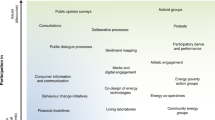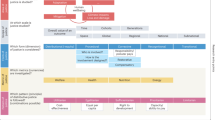Abstract
Rapid action is needed in the energy sector to respond to the climate emergency. Here we argue for the increased use of ‘realist’ approaches in sociotechnical energy studies to inform this action. Realist approaches ask not just ‘what works?’, but also ‘for whom, in what circumstances and why?’. They place emphasis on understanding the mechanisms by which outcomes of interventions (such as policies) come about and, crucially, how this depends on contextual factors. This can inform action based on existing learning from a wide range of sectors and disciplines—action that is tailored to be effective in specific contexts, and can respond to the potential for unjust outcomes. In this way they can support justice, interdisciplinary working, and urgency in energy research. We consider limitations and drawbacks of the approach (and responses to these), and present a guide to getting started.
This is a preview of subscription content, access via your institution
Access options
Access Nature and 54 other Nature Portfolio journals
Get Nature+, our best-value online-access subscription
$29.99 / 30 days
cancel any time
Subscribe to this journal
Receive 12 digital issues and online access to articles
$119.00 per year
only $9.92 per issue
Buy this article
- Purchase on Springer Link
- Instant access to full article PDF
Prices may be subject to local taxes which are calculated during checkout
Similar content being viewed by others
References
Gerpott, T. J. Biased choice of a mobile telephony tariff type: exploring usage boundary perceptions as a cognitive cause in choosing between a use-based or a flat rate plan. Telemat. Inform. 26, 167–179 (2009).
Berg, J. Income security in the on-demand economy: findings and policy lessons from a survey of crowdworkers. Comp. Labour Law Policy J. 37, 543–576 (2015).
Husk, K. et al. What approaches to social prescribing work, for whom and in what circumstances? A realist review. Health Soc. Care Community 28, 309–324 (2020).
Pawson, R. & Tilley, N. Realistic Evaluation (Sage, 1997).
Wong, G. et al. RAMESES II reporting standards for realist evaluations. BMC Med. 14, 96 (2016).
Pawson, R. & Tilley, N. Realist Evaluation (Sage, 2004); http://www.communitymatters.com.au/RE_chapter.pdf
HM Treasury. Magenta Book 2020: Supplementary Guide: Realist Evaluation (HM Treasury, 2020); https://assets.publishing.service.gov.uk/government/uploads/system/uploads/attachment_data/file/879435/Magenta_Book_supplementary_guide._Realist_Evaluation.pdf
Pawson, R., Greenhalgh, T., Harvey, G. & Walshe, K. Realist review—a new method of systematic review designed for complex policy interventions. J. Health Serv. Res. Policy 10, 21–34 (2005).
Wong, G., Greenhalgh, T., Westhorp, G., Buckingham, J. & Pawson, R. RAMESES publication standards: realist syntheses. BMC Med. 11, 21 (2013).
Pawson, R., Greenhalgh, T., Harvey, G. & Walshe, K. H. C. Realist Synthesis: an Introduction (ESRC Research Methods Programme, University of Manchester, 2004).
Emmel, N., Greenhalgh, J., Manzano, A., Monaghan, M. & Dalkin, S. (eds) Doing Realist Research (Sage, 2018); https://doi.org/10.4135/9781526451729
Pawson, R. & Tilley, N. in Evaluation for the 21st Century: A Handbook, 405–418 (Sage, 1997); https://doi.org/10.4135/9781483348896.n29
Marchal, B., Kegels, G. & Van Belle, S. in Doing Realist Research (eds Emmel, N. et al.) 79–90 (Sage, 2018); https://doi.org/10.4135/9781526451729.n6
The RAMESES II Project. ‘Theory’ in realist evaluation (Rameses Project, 2017); https://www.ramesesproject.org/media/RAMESES_II_Theory_in_realist_evaluation.pdf
Dalkin, S. M., Greenhalgh, J., Jones, D., Cunningham, B. & Lhussier, M. What’s in a mechanism? Development of a key concept in realist evaluation. Implement. Sci. 10, 49 (2015).
Greenhalgh, J. & Manzano, A. Understanding ‘context’ in realist evaluation and synthesis. Int. J. Soc. Res. Methodol. 0, 1–13 (2021); https://doi.org/10.1080/13645579.2021.1918484.
Westhorp, G. in Doing Realist Research (eds Emmel, N. et al.) 41–58 (Sage, 2018); https://doi.org/10.4135/9781526451729.n4
Emmel, N., Manzano, A., Dalkin, S., Monaghan, M. & Greenhalgh, J. in Doing Realist Evaluation, Synthesis and Research (Sage, 2018); https://doi.org/10.4135/9781526451729.n1
Astbury, B. in Doing Realist Research (eds Emmel, N. et al.) 59–78 (Sage, 2018); https://doi.org/10.4135/9781526451729.n5
Brand-Correa, L. I. & Steinberger, J. K. A framework for decoupling human need satisfaction from energy use. Ecol. Econ. 141, 43–52 (2017).
Wood, N. & Roelich, K. Tensions, capabilities and justice in climate change mitigation of fossil fuels. Energy Res. Soc. Sci. 52, 114–122 (2019).
Siciliano, G., Urban, F., Tan-Mullins, M. & Mohan, G. Large dams, energy justice and the divergence between international, national and local developmental needs and priorities in the global South. Energy Res. Soc. Sci. 41, 199–209 (2018).
Sovacool, B. K., Lipson, M. M. & Chard, R. Temporality, vulnerability and energy justice in household low carbon innovations. Energy Policy 128, 495–504 (2019).
Roddis, P., Carver, S., Dallimer, M., Norman, P. & Ziv, G. The role of community acceptance in planning outcomes for onshore wind and solar farms: an energy justice analysis. Appl. Energy 226, 353–364 (2018).
Schlosberg, D. Reconceiving environmental justice: global movements and political theories. Environ. Politics 13, 517–540 (2004).
Bouzarovski, S. & Petrova, S. A global perspective on domestic energy deprivation: overcoming the energy poverty-fuel poverty binary. Energy Res. Soc. Sci. 10, 31–40 (2015).
Day, R., Walker, G. & Simcock, N. Conceptualising energy use and energy poverty using a capabilities framework. Energy Policy 93, 255–264 (2016).
Robinson, C., Bouzarovski, S. & Lindley, S. Underrepresenting neighbourhood vulnerabilities? The measurement of fuel poverty in England. Environ. Plan A https://doi.org/10.1177/0308518X18764121 (2018).
Middlemiss, L. Energy poverty: understanding and addressing systemic inequalities. Inequality Energy https://doi.org/10.1016/B978-0-12-817674-0.00005-9 (2020).
Department for Business, Energy & Industrial Strategy Sustainable Warmth: Protecting Vulnerable Households in England (Department for Business, 2021).
Middlemiss, L. & Gillard, R. Fuel poverty from the bottom-up: characterising household energy vulnerability through the lived experience of the fuel poor. Energy Res. Soc. Sci. 6, 146–154 (2015).
Fox, N. Here Comes the Sun: The Evolution of a Prosuming Project Within a Social Housing Estate (University of Sussex, 2018).
Bale, C. S. E., Varga, L. & Foxon, T. J. Energy and complexity: new ways forward. Appl. Energy 138, 150–159 (2015).
Parrish, B., Heptonstall, P., Gross, R. & Sovacool, B. K. A systematic review of motivations, enablers and barriers for consumer engagement with residential demand response. Energy Policy 138, 111221 (2020).
Heptonstall, P. J. & Gross, R. J. K. A systematic review of the costs and impacts of integrating variable renewables into power grids. Nat. Energy 6, 72–83 (2021).
McAndrew, R., Mulcahy, R., Gordon, R. & Russell-Bennett, R. Household energy efficiency interventions: a systematic literature review. Energy Policy 150, 112136 (2021).
Sorrell, S. Improving the evidence base for energy policy: the role of systematic reviews. Energy Policy 35, 1858–1871 (2007).
Hanna, R., Parrish, B. & Gross, R. Best practice in heat decarbonisation policy: a review of the international experience of policies to promote the uptake of low-carbon heat supply (UKERC, 2016); https://ukerc.ac.uk/project/best-practice-in-heat-decarbonisation-policy/
Pawson, R. Evidence-Based Policy: a Realist Perspective (Sage, 2006).
Greenhalgh, T. et al. Storylines of research in diffusion of innovation: a meta-narrative approach to systematic review. Soc. Sci. Med. 61, 417–430 (2005).
Center for Theory of Change. What is Theory of Change? (Center for Theory of Change); https://www.theoryofchange.org/what-is-theory-of-change/
Blamey, A. & Mackenzie, M. Theories of change and realistic evaluation: peas in a pod or apples and oranges? Evaluation 13, 439–455 (2007).
Rolfe, S. Combining theories of change and realist evaluation in practice: lessons from a research on evaluation study. Evaluation 25, 294–316 (2019).
Willand, N., Maller, C. & Ridley, I. Understanding the contextual influences of the health outcomes of residential energy efficiency interventions: realist review. Hous. Stud. 35, 1–28 (2020).
Willand, N., Ridley, I. & Maller, C. Towards explaining the health impacts of residential energy efficiency interventions—realist review. Part 1: pathways. Soc. Sci. Med. 133, 191–201 (2015).
Middlemiss, L. et al. Energy poverty and social relations: a capabilities approach. Energy Res. Soc. Sci. 55, 227–235 (2019).
Fell, M. J. Anticipating distributional impacts of peer-to-peer energy trading: inference from a realist review of evidence on Airbnb. Clean. Responsible Consum. 2, 100013 (2021).
Edelman, B., Luca, M. & Svirsky, D. Racial discrimination in the sharing economy: evidence from a field experiment. Am. Econ. J. Appl. Econ. 9, 1–22 (2017).
RAMESES Projects. Welcome to ramesesproject.org. https://www.ramesesproject.org/Home_Page.php
Acknowledgements
M.J.F. acknowledges funding from UK Research and Innovation through the Centre for Research into Energy Demand Solutions, grant reference no. EP/R035288/1, and UK Research and Innovation grant no. EP/S031863/1 ‘Energy Revolution Research Consortium—Core—EnergyREV’, administered by the Engineering and Physical Sciences Research Council (EPSRC). K.R. acknowledges funding from the UK Engineering and Physical Sciences Research Council grant no. EP/R007403/1, Adaptive Decision Making for Urban Energy Transformation, and from the University of Leeds ESRC Impact Acceleration Account. L.M. acknowledges funding from the European Union’s Horizon 2020 programme under grant agreement ID 945097, Wellbased. We gratefully acknowledge input by J. Greenhalgh.
Author information
Authors and Affiliations
Corresponding author
Ethics declarations
Competing interests
The authors declare no competing interests.
Peer review
Peer review information
Nature Energy thanks William Blyth, Robert Gross, Paula Kivimaa and Geoff Wong for their contribution to the peer review of this work.
Additional information
Publisher’s note Springer Nature remains neutral with regard to jurisdictional claims in published maps and institutional affiliations.
Rights and permissions
Springer Nature or its licensor holds exclusive rights to this article under a publishing agreement with the author(s) or other rightsholder(s); author self-archiving of the accepted manuscript version of this article is solely governed by the terms of such publishing agreement and applicable law.
About this article
Cite this article
Fell, M.J., Roelich, K. & Middlemiss, L. Realist approaches in energy research to support faster and fairer climate action. Nat Energy 7, 916–922 (2022). https://doi.org/10.1038/s41560-022-01093-8
Received:
Accepted:
Published:
Issue Date:
DOI: https://doi.org/10.1038/s41560-022-01093-8



